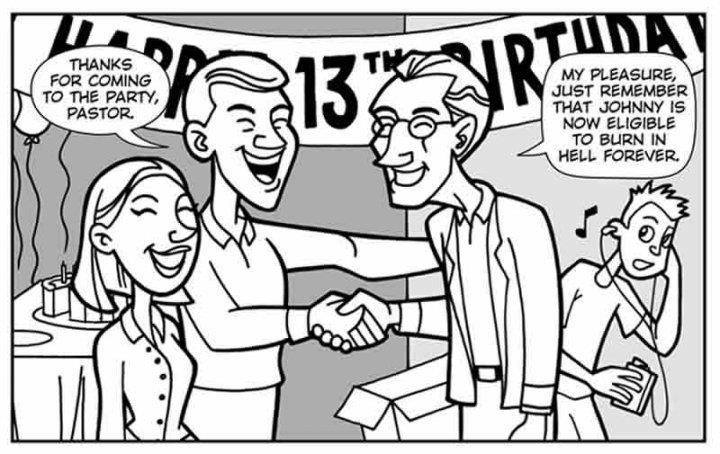
A few years ago, the Babylon Bee published a satirical article entitled “Woman Finally Accepts Doctrine of Total Depravity Now That Daughter Is Two.” The article was about a young mother who became convinced about the doctrine of total depravity after her child became a toddler:
I had the hardest time coming to grips with the idea that all the people I see around me are marred by sin and without hope but for the grace of God,” the young mother told reporters. “But now that Charlotte is two—hoo boy. That innate depravity is shining through with the brightness of a thousand suns.
It was a fictional piece but it carried a grain of truth. As many parents can attest, sweet babies sometimes turn into little monsters.
As soon as the child discovers their will, selfishness rears its ugly head. Tantrums, uneaten meals, and an all-round refusal to do what they are told seems to prove the existence of original sin.
“Little Johnny is proof positive that we’re born rebels. Grab the rod. We’re going to train that sinfulness right out of him!”
Or maybe there is another way to look at it.
If you have been following my series on original sin, you will know that I do not subscribe to the idea that we inherited a sinful nature from our parents. I am convinced that Augustine’s doctrine of original sin is unbiblical. And illogical.
So why do two-year olds act like selfish little sinners? Because that’s how they’ve been raised.
A selfish toddler is a product of their upbringing. For their entire life, they have been waited on hand and foot.
If they are hungry, an adult will feed them. If they are dirty, an adult will wash them. They have done little for themselves and nothing for others.
Their selfishness is not inherited but is a learned behavior, and one that has been reinforced every day of their lives.
And that is exactly what God intended.
A selfish toddler is basically a big baby because what else are they going to be? For every day of its life, the toddler has had one lesson reinforced again and again: crying and making a fuss gets results. So of course they are going to cry and act out. This is the only trick they know.
Once the toddler is over the infantile hump of helplessness, they can be taught other skills, like self-control, kindness, and consideration for others.
Train up a child in the way he should go. Even when he is old he will not depart from it. (Proverbs 22:6)
The Scriptures exhort parents to train their children. But if original sin is true and little Johnny is genetically inclined to sin, how will training help? You might as well train him to be tall.
“But Paul, haven’t you heard of the terrible twos?”
As a father of four, I am well-acquainted with the ways of toddlers. I have learned that the terrible twos are largely an invention of parents who are overwhelmed by the considerable challenge of training toddlers.
God made parents stronger, smarter, and faster than their children, yet some parents act like their kids are on the throne.
It is a blessing to have strong-willed children, and the last thing we want to do is break their little spirits. (“Don’t exasperate your children” (Col. 3:21).) But you’d have to be nuts to let a small child run your life.
This is not the place where I discuss Parenting 101, but let me leave you with this: Jesus said make a tree good or make a tree bad (Matt. 12:33). We make our children good by teaching them the ways of the Lord and by leading them to One who is the Source of goodness. And we make our children bad by sending them unprepared into a corrupt world full of lies and deception.
Fathers, do not provoke your children to anger, but bring them up in the discipline and instruction of the Lord. (Ephesians 6:4)
A child’s heart is like soil. Into this soil we can sow the good seed of God’s word or we can let the devil plant weeds. We can nurture our kids with love, or we can neglect them. We can bring them up in the ways of the Lord or we can leave them to be raised by wolves.
Ignatius of Loyola (1491–1556), the founder of the Jesuits, famously said, “Give me a child till he is seven years old, and I will show you the man.” He understood that who we become is determined in early childhood. We are not born with a sinful nature but we can be made into full-blown sinners and this process is hastened by parental neglect.
Through the praise of children and infants you have established a stronghold against your enemies, to silence the foe and the avenger. (Psalm 8:2, NIV)
When young children are raised well, it brings glory to their Maker. When they praise the Lord, it renders his enemies speechless.
I’ve seen young children heal the sick, prophesy, and lead people to Jesus. I am not surprised when this happens because I know God has chosen the foolish and the weak to confound the wise and the strong.
Whoever receives one child like this in my name receives me; and whoever receives me does not receive me, but him who sent me. (Mark 9:37)
In the Gospels there were some who wanted to keep the children out of sight. This displeased Jesus. He put children front and center and said things like “whoever receives one of them receives me.” How do we receive a child in Jesus’ name? By seeing them as ministers ordained to declare God’s praise.
Original sinners? Hardly. How about original masterpieces, ready to reveal the gifts of their Maker?
If you think your children were born with a sinful nature and innately rebellious it will limit your expectation of what God can do through them. You’ll see the folly in their youthful hearts and miss the praise that God has ordained to silence his enemies.
But if you see your children as gifts from God and ministers of his grace, your expectation will help release them into their God-given destiny.
—–
Extracted and adapted from Paul’s ebook, Original Sin: What Does the Bible Really Say? available now on Patreon, along with these great titles:
Having trouble logging into Patreon? Read this. Issues with a declined card? Read this.






